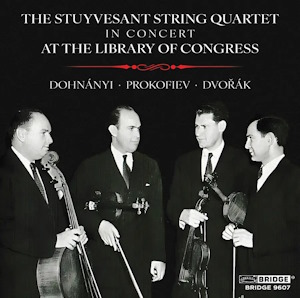
Stuyvesant String Quartet
In Concert at the Library of Congress
Ernő Dohnányi (1877-1960)
String Quartet No 2 in D-flat major, Op 15 (1907)
Sergei Prokofiev (1891-1953)
String Quartet No 1 in B minor, Op 50 (1930)
Antonín Dvořák (1841-1904)
String Quartet No 12 in F major, Op 96 ‘American’ (1893)
rec. December 1946, Coolidge Auditorium, Library of Congress, Washington DC
Bridge Records 9607 [77]
On 30 December 1946, the Stuyvesant String Quartet were recorded in the Coolidge Auditorium of the Library of Congress in Washington DC playing a three-quartet concert of works by Dohnányi, Prokofiev and Dvořák. As usual, the performances were taken down on lacquers. The group then comprised Sylvan Shulman and Bernard Robbins, violins, Ralph Hersh, viola, and Alan Shulman, cello.
Fortunately, a number of their recordings, studio and live, have appeared over the years. Their compelling interpretations of Villa Lobos, Hindemith and Quincy Porter can be found on Parnassus whilst Artek restored their collaborations with harpist Laura Newell and Bridge have been active on the group’s behalf – Bridge 9137 contains Malipiero No 1, the Debussy and Ravel, and a work, with clarinettist Benny Goodman, by Alan Shulman.
It so happens that almost exactly two years later, after their visit, the London String Quartet came to the Library of Congress to play the same Dohnányi Quartet that the Stuyvesant did in 1946 – No 2 in D-flat major. The differences between the density of sound and tempo decisions of the two groups are instructive. The lean, clean-limbed and largely transparent instincts of the Stuyvesant are attractive but decidedly more impersonal than the late-romanticism located by the LSQ who, with their heavier vibratos and denser corporate sound, bring a richer and more expressive quality to the music. Their implacability brings richer rewards as well in the Scherzo – the Stuyvesant sound timid in comparison, though they play the chorale with chaste beauty. Throughout the LSQ, which had been playing the work for thirty years show the greater familiarity and mastery of its syntax.
The Prokofiev is another matter. It had been premiered by the Brosa Quartet in 1931 and the Stuyvesant players respond well to its asperity and terse lyricism. It was a work of which they had already made a studio recording, for Columbia in 1941, though with an earlier line-up of Shulman-Glickman-Kievman-Shulman. The conception remains much the same, though, as does the corporate sound of the ensemble. If you’re used to the contemporary recordings of the Emerson or Pavel Haas Quartets in this work, you may well find the opening movement rather on the slow side. The pivotal finale of this quartet, though, and its focal point, is an Andante of gravity, which finds the group at its peak, finding melancholy through a very vocalised corporate sound.
For the final piece, they played Dvořák’s ‘American’ Quartet in a fine middle-of-the-road performance. I tend to find violist Ralph Hersh’s viola sound to be rather on the sec side but the corporate playing has buoyancy and there are some gleefully splendid sonorities in the slow movement that can be savoured in full.
Bridge’s notes are the work of Jay Shulman, writing on the Stuyvesant, and Laurie Shulman on the music performed. The lacquers suffered some damage but it’s minimal and has been tactfully masked in these good restorations.
Jonathan Woolf
Buying this recording via a link below generates revenue for MWI, which helps the site remain free




















